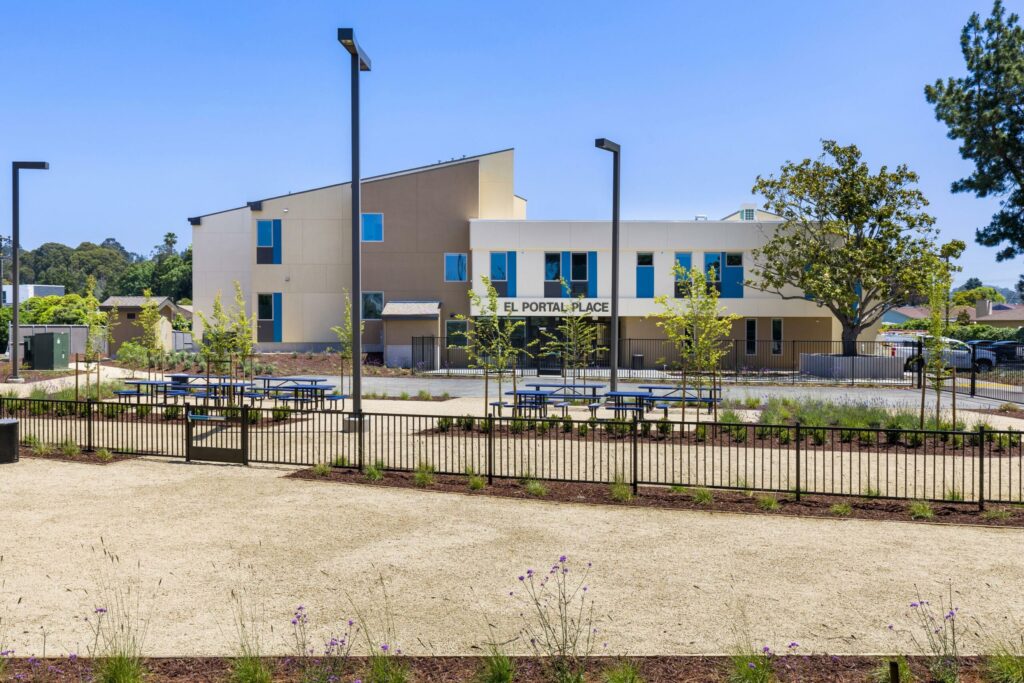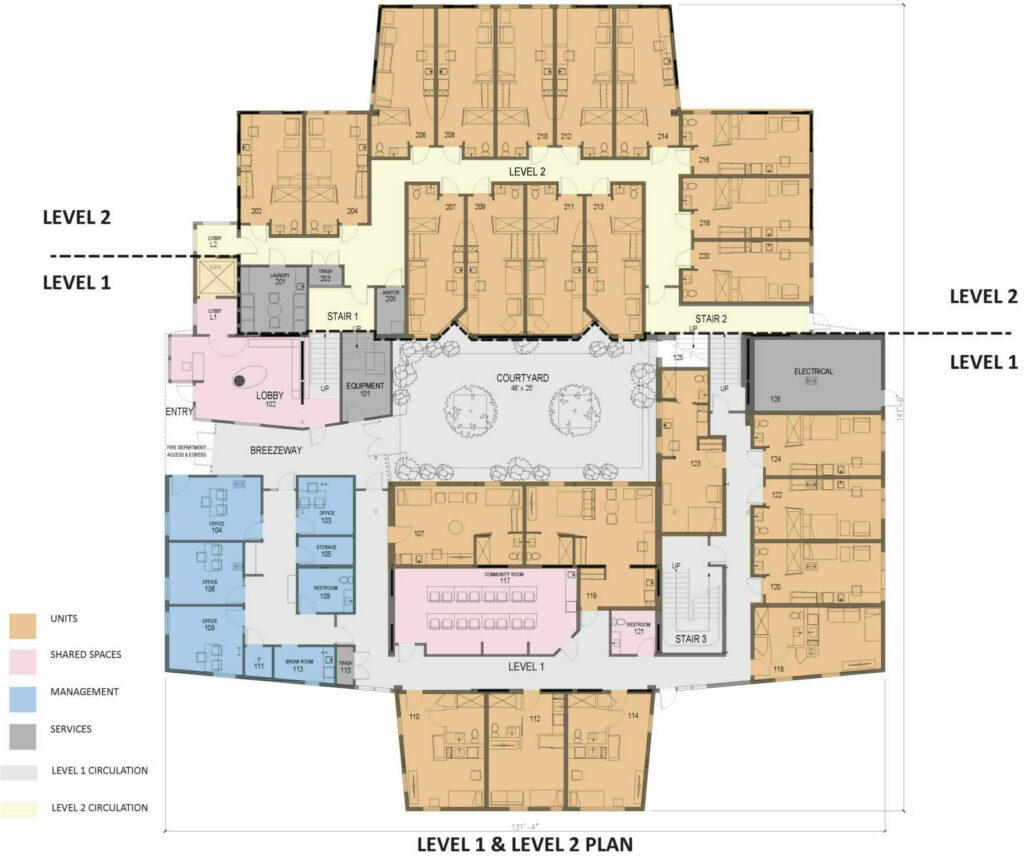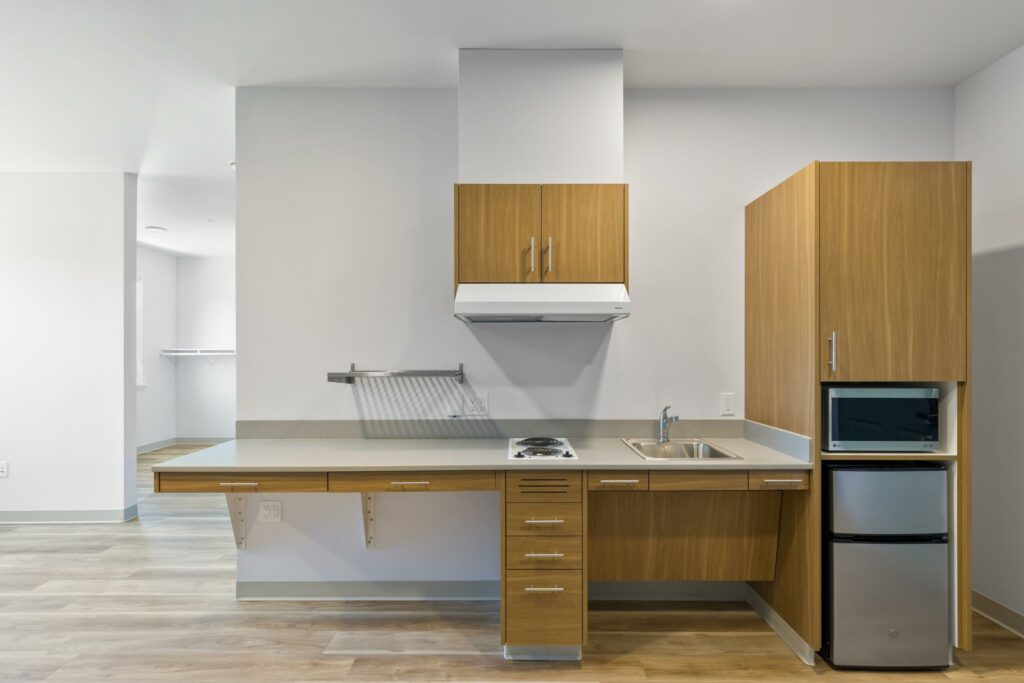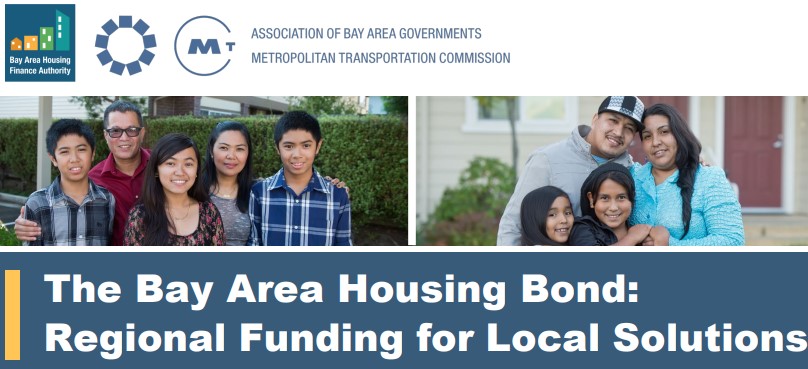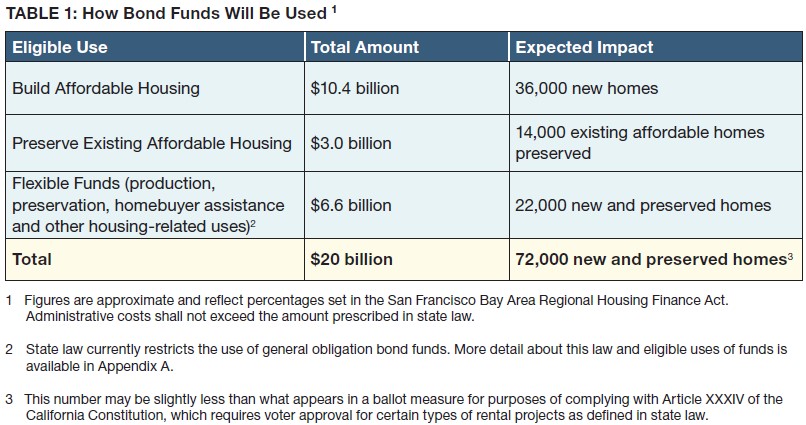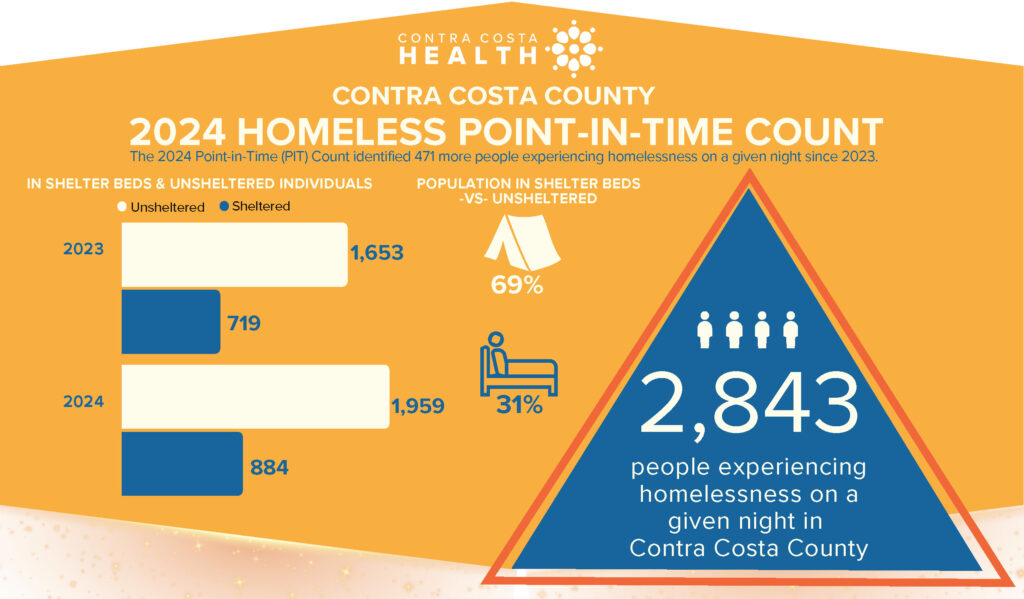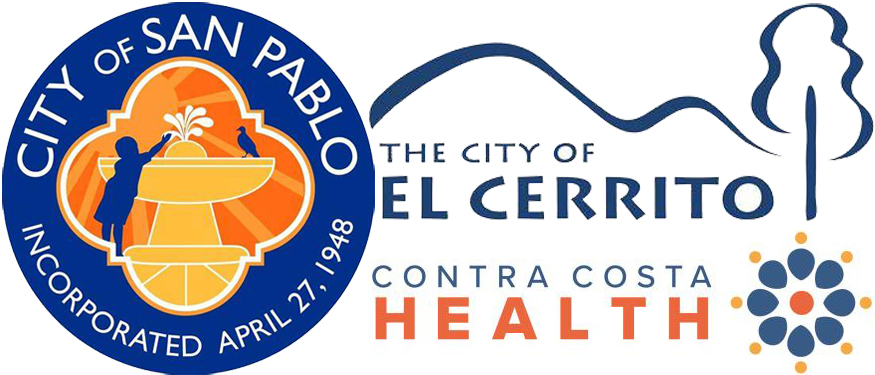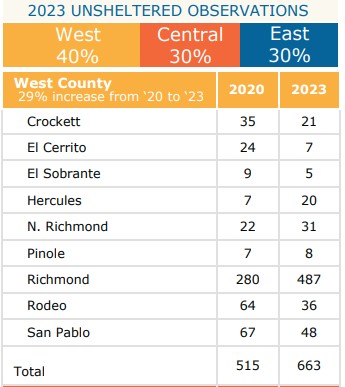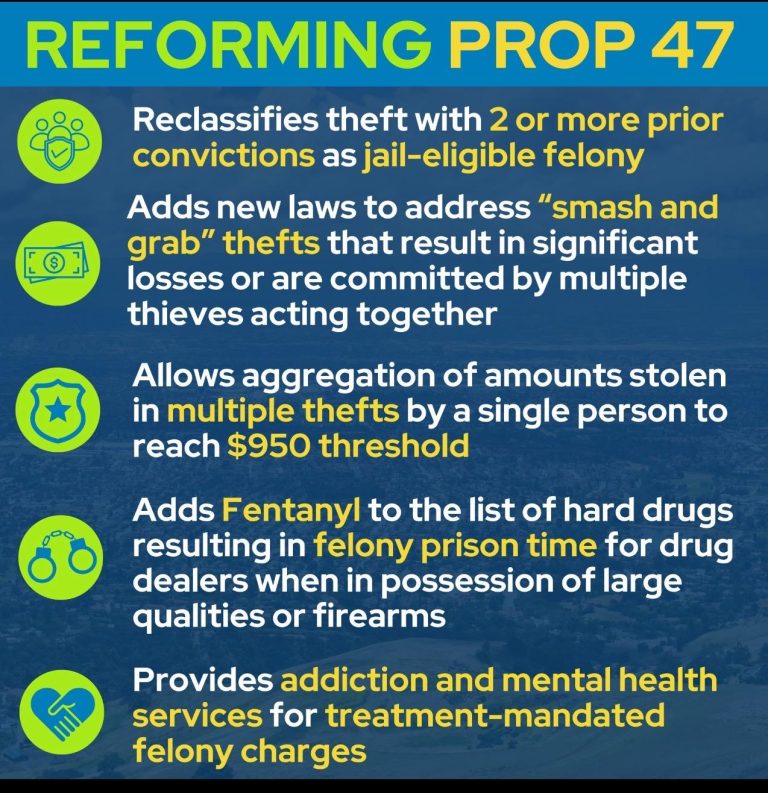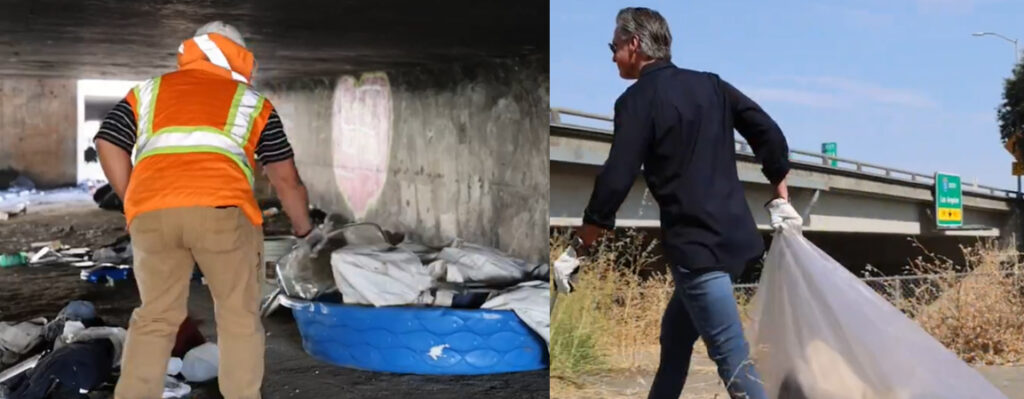
A state worker cleans out an encampment under a freeway overpass. Gov. Gavin Newsom contributes to the effort following the announcement of his executive order on Thursday, July 25, 2024. Video screenshots. Source: Office of the CA Governor
Following U.S. Supreme Court ruling
Encourages local governments to adopt similar policies
“We’re done. It’s time we move with urgency at the local level to clean up these sites. This executive order is about…getting the sense of urgency that’s required of local government to do their job.” – Gov. Newsom
What you need to know: Governor Newsom today issued an executive order directing state agencies to urgently address homeless encampments while respecting the dignity and safety of Californians experiencing homelessness. The Governor’s order, which follows the Supreme Court’s decision in Grants Pass, also urges local governments to use substantial funding provided by the state to take similar action.
SACRAMENTO, CA — Building on California’s ongoing work and unprecedented investments to address the decades-long issue of homelessness, Governor Gavin Newsom issued an executive order today ordering state agencies and departments to adopt clear policies that urgently address homeless encampments while respecting the dignity and well-being of all Californians.
With the recent U.S. Supreme Court decision in Grants Pass v Johnson, local governments now have the tools and authority to address dangerous encampments and help provide those residing in encampments with the resources they need.
“This executive order directs state agencies to move urgently to address dangerous encampments while supporting and assisting the individuals living in them — and provides guidance for cities and counties to do the same. The state has been hard at work to address this crisis on our streets. There are simply no more excuses. It’s time for everyone to do their part.” said Newsom. “We’re done. It’s time we move with urgency at the local level to clean up these sites. This executive order is about…getting the sense of urgency that’s required of local government to do their job.”
The governor’s executive order directs state agencies and departments to adopt humane and dignified policies to urgently address encampments on state property, including by taking necessary and deliberate steps to notify and support the people inhabiting the encampment prior to removal.
Governor Newsom has made record-level investments to address the housing crisis, investing over $24 billion across multiple state agencies and departments, including billions of dollars in funding to assist local jurisdictions in providing services and wrap-around support to people living in encampments. In Fiscal Year 2022-2023, these investments helped lift more than 165,000 people out of homelessness and into interim or permanent housing.
California blueprint
Governor Newsom’s order directs state agencies and departments to adopt policies and plans consistent with the California Department of Transportation’s (Caltrans) existing encampment policy. Since July 2021, California has resolved more than 11,000 encampments, and has removed 248,275 cubic yards of debris from encampments along the state right of way in preparation for Clean California projects. Prioritizing encampments that pose a threat to the life, health, and safety of the community, Caltrans provides advance notice of clearance and works with local service providers to support those experiencing homelessness at the encampment, and stores personal property collected at the site for at least 60 days.
The order encourages local governments to emulate the state’s successful model to adopt local policies and to use all available resources, including those provided by the state’s historic investments in housing and intervention programs, to address encampments within their jurisdictions.
Proposition 1 funding available for local governments
Governor Newsom also encourages local governments to apply for the newly available $3.3 billion in competitive grant funding from Proposition 1 to expand the behavioral health continuum and provide appropriate care to individuals experiencing mental health conditions and substance use disorders — with a particular focus on people who are most seriously ill, vulnerable, or homeless.
Proposition 1 includes two parts: a $6.4 billion Behavioral Health Bond for treatment settings and housing with services, and historic reform of the Behavioral Health Services Act (BHSA) to focus on people with the most serious illnesses, substance disorders, and housing needs. The state also recently released the Proposition 1 Behavioral Health Services Act: Housing Supports Primer (July 2024) for counties, which explains how to spend the projected $950 million annual BHSA revenue on housing interventions.
Unprecedented investments to support communities
Governor Newsom is tackling California’s homelessness crisis head-on. Since he took office, the state has developed a Statewide Action Plan for Preventing and Ending Homelessness and the Governor has demanded unprecedented accountability from local governments to do their part to end the homelessness crisis through regionally coordinated action plans. The Governor has also pioneered nation-leading homeless and housing reforms and invested more than $24 billion to address this crisis with state and local support, including $4.85 billion for Homeless, Housing Assistance and Prevention Grants for local jurisdictions to prevent and reduce homelessness, $1 billion in Encampment Resolution Funding to assist local jurisdictions in providing services and supports to people living in encampments, and $3.3 billion for Homekey to rapidly expand housing for persons experiencing homelessness.
See Newsom’s announcement video on X.
A copy of today’s executive order can be found here and here:
EXECUTIVE ORDER N-1-24
WHEREAS California is experiencing a homelessness crisis decades in the making, with over 180,000 people estimated to have experienced homelessness on any given night in 2023, including 123,000 people who experienced unsheltered homelessness, living in tents, trailers, and vehicles across the state; and WHEREAS within the first year of my Administration I fast-tracked the development of shelter through Executive Order N-23-20, which directed departments to assess and facilitate the use of available state land and resources for short-term emergency homeless shelters; and WHEREAS since the beginning of my Administration, the State has made unprecedented investments to address the homelessness crisis head on, investing more than $24 billion across multiple state agencies and departments, including $4.85 billion in flexible funding to local jurisdictions to prevent and reduce homelessness through Homeless Housing, Assistance and Prevention grants, $1 billion in Encampment Resolution Funding to assist local jurisdictions in providing services and supports to people living in encampments, and $3.3 billion to rapidly expand housing for persons experiencing homelessness through Homekey; and
WHEREAS the State has redoubled its commitment to holding local jurisdictions accountable to reduce homelessness, including by strengthening and enforcing requirements that local jurisdictions plan for their fair share of housing and by conditioning state homelessness funding on rigorous reporting and measurable performance metrics; and
WHEREAS it is imperative to act with urgency to address dangerous encampments, which subject unsheltered individuals living in them to extreme weather, fires, predatory and criminal activity, and widespread substance use, harming their health, safety, and well-being, and which also threaten the safety and viability of nearby businesses and neighborhoods and undermine the cleanliness and usability of parks, water supplies, and other public resources; and
WHEREAS while every jurisdiction must do more to address encampments, state and local agencies taking proactive steps to remove encampments have been stymied in those efforts by lawsuits and injunctions, leaving officials without the tools or guidance necessary to address the crisis on their streets; and
WHEREAS in September 2023, I called on the United States Supreme Court to grant review in City of Grants Pass v. Johnson to clarify that state and local officials can take reasonable actions to resolve encampments while respecting the humanity of all Californians; and
WHEREAS in June 2024 the Supreme Court overturned Ninth Circuit Court of Appeals precedent that restricted the government’s authority to enforce laws regulating encampments, recognizing that jurisdictions may tailor their enforcement practices to reflect policy-driven approaches to addressing homelessness; and
WHEREAS with the threat of these types of injunctions removed, there is no longer any barrier to local governments utilizing the substantial resources provided by the State, in tandem with federal and local resources, to address encampments with both urgency and humanity, or excuse for not doing so; and WHEREAS guidelines that prioritize offers of shelter and services as a first step to resolving any encampment best respect the dignity of every Californian and provide meaningful paths to ending homelessness; and
WHEREAS the California Interagency Council on Homelessness leads California’s efforts to prevent and end homelessness; and
WHEREAS the California Department of Transportation maintains a policy directive that prioritizes removal of encampments that pose threats to life, health, and safety, while partnering with local governments and nonprofit providers to facilitate offers of shelter and supportive services in advance of a removal; and WHEREAS the California Department of Transportation has, since July 2021, removed 11,188 encampments and 248,275 cubic yards of debris from these encampments along the state rights of way.
NOW, THEREFORE, I, GAVIN NEWSOM, Governor of the State of California, in accordance with the authority vested in me by the State Constitution and statutes of the State of California, do hereby issue the following Order to become effective immediately:
IT IS HEREBY ORDERED THAT:
1) Agencies and departments subject to my authority shall adopt policies, generally consistent with California Department of Transportation’s Maintenance Policy Directive 1001-R1, to address encampments on state property, including through partnerships with other state and local agencies, and shall prioritize efforts to address encampments consistent with such policy. Such policies shall include the following:
- Whenever feasible, site assessment in advance of removal operations to determine whether an encampment poses an imminent threat to life, health, safety or infrastructure such that exigent circumstances require immediate removal of the encampment.
- Where exigent circumstances exist, as much advance notice to vacate as reasonable under the circumstances.
- Where no exigent circumstances exist, posting of a notice to vacate at the site at least 48 hours prior to initiating removal
- Contacting of service providers to request outreach services for persons experiencing homelessness at the encampment.
- Collection, labeling, and storage for at least 60 days of personal property collected at the removal site that is not a health or safety hazard.
2) All departments and agencies not under my authority are requested to adopt policies consistent with the guidelines in Paragraph 1.
3) Local governments are encouraged to adopt policies consistent with this Order and to use all available resources and infrastructure, including resources provided by the State’s historic investments in housing and intervention programs where appropriate and available, to take action with the urgency this crisis demands to humanely remove encampments from public spaces, prioritizing those encampments that most threaten the life, health, and safety of those in and around them.
4) The California Interagency Council on Homelessness shall develop guidance and provide technical assistance consistent with this Order for local governments to follow in implementing their local homelessness programs.
IT IS FURTHER ORDERED that, as soon as hereafter possible, this Order be filed in the Office of the Secretary of State and that widespread publicity and notice be given of this Order. This Order is not intended to, and does not, create any rights or benefits, substantive or procedural, enforceable at law or in equity, against the State of California, its agencies, departments, entities, officers, employees, or any other person.
IN WITNESS WHEREOF I have hereunto set my hand and caused the Great Seal of the State of California to be affixed this 25th day of July.
GAVIN NEWSOM
Governor of California
Allen D. Payton contributed to this report.


